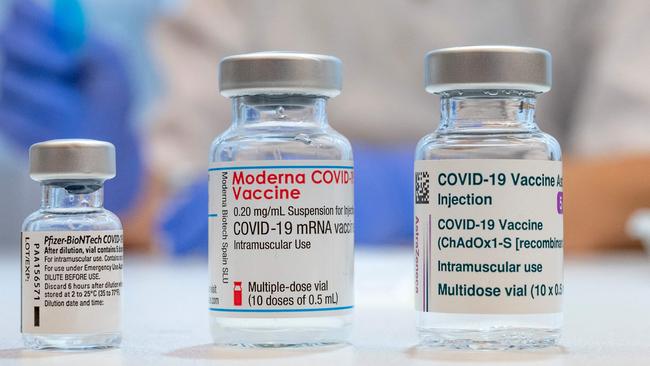Vaccine mix study suggests combinations safe and effective
A separate study finds a third AstraZeneca shot can be a highly effective booster, as researchers focus on next-generation regimens.

Alternating a dose of Covid-19 vaccine made by Pfizer Inc. with one from AstraZeneca PLC is safe and provides a strong immune response against the disease, a new study shows.
Researchers said the findings support the practice of mixing vaccines in certain circumstances. The U.K.-funded study found that mixing the Pfizer and AstraZeneca doses improved on the immune response provided by a two-dose regimen of the AstraZeneca shot. Alternating the shots provided less of a key immune response, however, than that provided by two doses of the Pfizer shot.
The interim findings, led by the University of Oxford but not yet reviewed by independent scientists, support the practice under way in several countries, including Canada and parts of Europe, of mixing vaccine types, researchers said. In some cases, health officials have supplemented one kind of shot with a different one because of supply issues.
In other instances, revised health advice related to vaccine side effects has called for a different second shot. For instance, in parts of Europe, health officials have recommended against younger adults getting the AstraZeneca shot because of very rare but sometimes deadly blood clotting linked to the vaccine. That guidance came out after many younger adults had already gotten a first injection of the AstraZeneca shot. They are now being offered a Pfizer shot or one by Moderna Inc.
A separate study out of Oxford on Monday — also not peer-reviewed — found that the AstraZeneca vaccine provides a strong bump to immunity when given as a third dose, or booster, more than six months after two doses of the same shot.
The pandemic has reached a point where researchers are trialing next-generation vaccines and testing how different technologies work together. The AstraZeneca vaccine, developed with Oxford, is a viral-vector shot, using an altered, harmless cold virus to ferry genetic material into human cells. It instructs them to create Covid-19 spike proteins, spurring an immune response against Covid-19. The shot isn’t approved for use in the US.
Vaccines from Pfizer and Moderna are messenger RNA vaccines, named after the molecular couriers that deliver genetic instructions to cells to trigger the immune response.
The U.K. government is funding the mix-and-match vaccine study, named “Com-COV,” with 830 volunteers. Monday’s readout involved mixing the Pfizer shot, developed with BioNTech SE, and the AstraZeneca vaccine, but further analysis will include vaccines by Moderna and Novavax Inc.
Independent researchers said the data has limits. It measured lab-based immunity readings rather than actual efficacy. Comparing antibody counts in blood samples isn’t the same as observing real-world illness, they said. Still, the findings will likely spur more countries to explore mixing vaccine types, adding flexibility to rollouts.

Last week, German Chancellor Angela Merkel received as her second dose a shot from Moderna, which uses the same technology as the Pfizer shot. She had earlier received the AstraZeneca vaccine. Her spokesman told reporters the decision to mix vaccine types might help assuage worries about “cross-vaccination.” U.K. health officials recommended against changing standard U.K. policy, which doesn’t generally advise mixing shots.
“The default would be to stick with the [vaccine] schedules that we actually know,” from larger, long-running clinical trials, said Matthew Snape, the study’s lead investigator at Oxford. He wasn’t part of the research team that led the vaccine’s development with AstraZeneca.
In the study, participants aged 50 and older were given either two doses of the AstraZeneca vaccine, two doses of the Pfizer vaccine, AstraZeneca then Pfizer, or Pfizer then AstraZeneca, four weeks apart.
Participants who received two doses of the Pfizer vaccine generated the highest number of antibodies against the coronavirus spike protein. But the immune response from those who received AstraZeneca then Pfizer almost matched levels reached with two Pfizer shots. Participants in the AstraZeneca-Pfizer group generated more than nine times the antibodies of those dosed twice with AstraZeneca.
Pfizer followed by AstraZeneca also showed a stronger antibody response than two shots of AstraZeneca. But the order mattered, with the Pfizer-AstraZeneca group lagging behind the AstraZeneca-Pfizer group. Still, participants in the Pfizer-AstraZeneca group generated around five times the antibodies of those who received two AstraZeneca doses.
The study also suggested that a mix-and-match approach could produce a stronger T-cell immune response than receiving two doses of either vaccine. A first dose of AstraZeneca followed by Pfizer produced the strongest T-cell response of any group, followed by the Pfizer-AstraZeneca combination. Scientists say both types of immunity help protect against the coronavirus, but it is not yet clear which, if either, plays a bigger role.
Volunteers who received a mixture of two vaccines were more likely to experience side effects, but these were mild to moderate, and generally short-lived. The researchers cautioned that the study wasn’t large enough to catch rare side effects.
The separate booster-shot study was led by other Oxford scientists who were involved in the vaccine’s development. They also found that a prolonged lag between the initial two doses of up to 45 weeks enhanced immunity from the vaccine. The researchers said the more dramatic delayed-dosing findings are good news for countries facing shortages of vaccines.
The vaccine’s apparent value as a booster could influence plans in the U.K. and beyond for a potential additional round of vaccinations in autumn and winter. There has been concern among some scientists that viral vector shots like the AstraZeneca one might be less useful than other vaccines as boosters. A major question has been whether the body might build resistance to the vaccine’s payload, rendering it less potent in topping up Covid immunity.
The Wall Street Journal







To join the conversation, please log in. Don't have an account? Register
Join the conversation, you are commenting as Logout